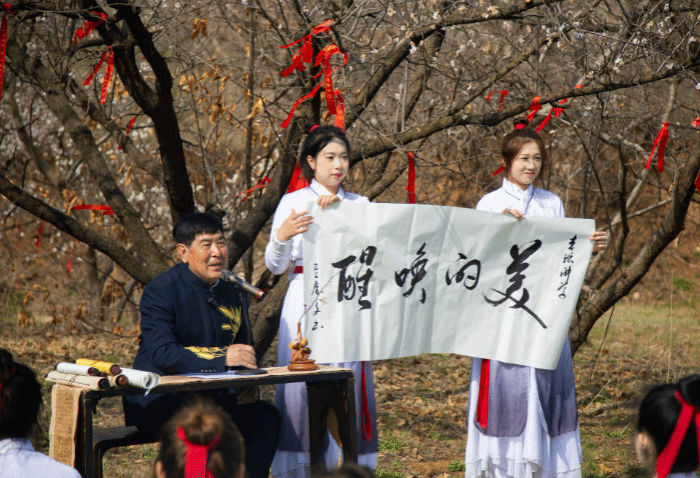To promote traditional culture and awaken the power of aesthetics, in response to the Yantai Municipal Government’s Three-Year Action Plan for the Public Aesthetic Education Project, the "Lectures at the Apricot Altar" event was held in the apricot grove of Dashanhou Village, Jiejiazhuang Sub-district, Laishan District on the morning of April 3rd. Co-sponsored by Shandong Business Vocational College, the Publicity Department of Laishan District Committee of the CPC, and Yantai Cultural Center, and jointly organized by Jiejiazhuang Sub-district Office, Jizhi Aesthetics (Yantai) Cultural Development Co., Ltd., and Yantai Shanhaiqing Cultural Tourism and Health & Wellness Co., Ltd., the event was themed "Lectures at the Apricot Altar, Awakening the Power of Aesthetics." Through a combination of aesthetic education lectures and traditional cultural experiences, it enabled young students to feel the charm of excellent traditional Chinese culture amidst the blooming apricot blossoms in spring, enhancing their aesthetic literacy and cultural confidence.

On the day of the event, several leaders and guests attended, including Zou Debao, Deputy Minister of the Publicity Department of the CPC Yantai Municipal Committee; Zhang Yue, Deputy Secretary of the Party Committee of Shandong Business Vocational College; Cao Lei, Chief of the Civilization Cultivation Section of the Publicity Department of the CPC Yantai Municipal Committee; Li Jingwei, Executive Deputy Minister in charge of daily work of the Publicity Department of Laishan District Committee of the CPC; Jiang Haofeng, Secretary of the Jiejiazhuang Sub-district Working Committee of the CPC; Shi Hao, Deputy Secretary of the Jiejiazhuang Sub-district Working Committee of the CPC; Han Ying, Deputy Director of Yantai Cultural Center; Li Gang, Director of the Basic Education Department of Shandong Business Vocational College; Wang Yuhong, Director of the Aesthetic Education Teaching and Research Office; Zhang Yunping, Secretary of the Party Branch and Director of the Basic Education Department of Yantai Cultural Tourism Vocational College, as well as Director of the Yantai Aesthetic Education Center; Zhang Chunxia, Secretary of the Party Branch and Director of the Basic Education Department of Yantai Engineering and Technology Vocational College, as well as Head of the Humanistic Quality Education Center; and Zhang Shunhua, Secretary of the Party Branch of Dashanhou Village in Jiejiazhuang Sub-district, Laishan District. Renowned aesthetic education expert Yu Wenshu, former Deputy Secretary of the Party Committee of Yantai University, served as the keynote speaker for the "Lectures at the Apricot Altar" event, delivering a wonderful lecture on aesthetic education to the audience.During the "Lectures at the Apricot Altar – Aesthetic Education Special Session," Professor Yu Wenshu, with the topic "Awakening the Power of Aesthetics," elaborated on the connotation of beauty, ancient aesthetic education thoughts, the Six Arts (ritual, music, archery, charioteering, calligraphy, and mathematics), and the significance of aesthetic education in contemporary education. He pointed out that aesthetic education is not merely art education but also an important approach to personality cultivation, helping young students establish correct aesthetic views, cultivate noble sentiments, and become well-rounded talents in the new era.

During the event, students from the Hanfu Club of Shandong Business Vocational College demonstrated etiquette gestures, allowing the audience to experience the norms of ancient etiquette firsthand. College students and Professor Yu jointly recited excerpts from The Analects, recreating the melodious sounds of ancient academies. Professor Yu's lecture was both vivid and profound, earning warm applause from the audience. This "Lectures at the Apricot Altar" event combined aesthetic education with traditional culture in an innovative format, providing a platform for young students to learn, experience, and reflect. It not only carried forward the spirit of "Lectures at the Apricot Altar" but also made positive contributions to promoting aesthetic education and inheriting excellent traditional Chinese culture. In the future, the organizers will continue to deepen university-local cooperation, launching more diverse and content-rich aesthetic education activities to contribute to the cultivation of socialist builders and successors who are well-rounded in moral, intellectual, physical, aesthetic, and labor education.

